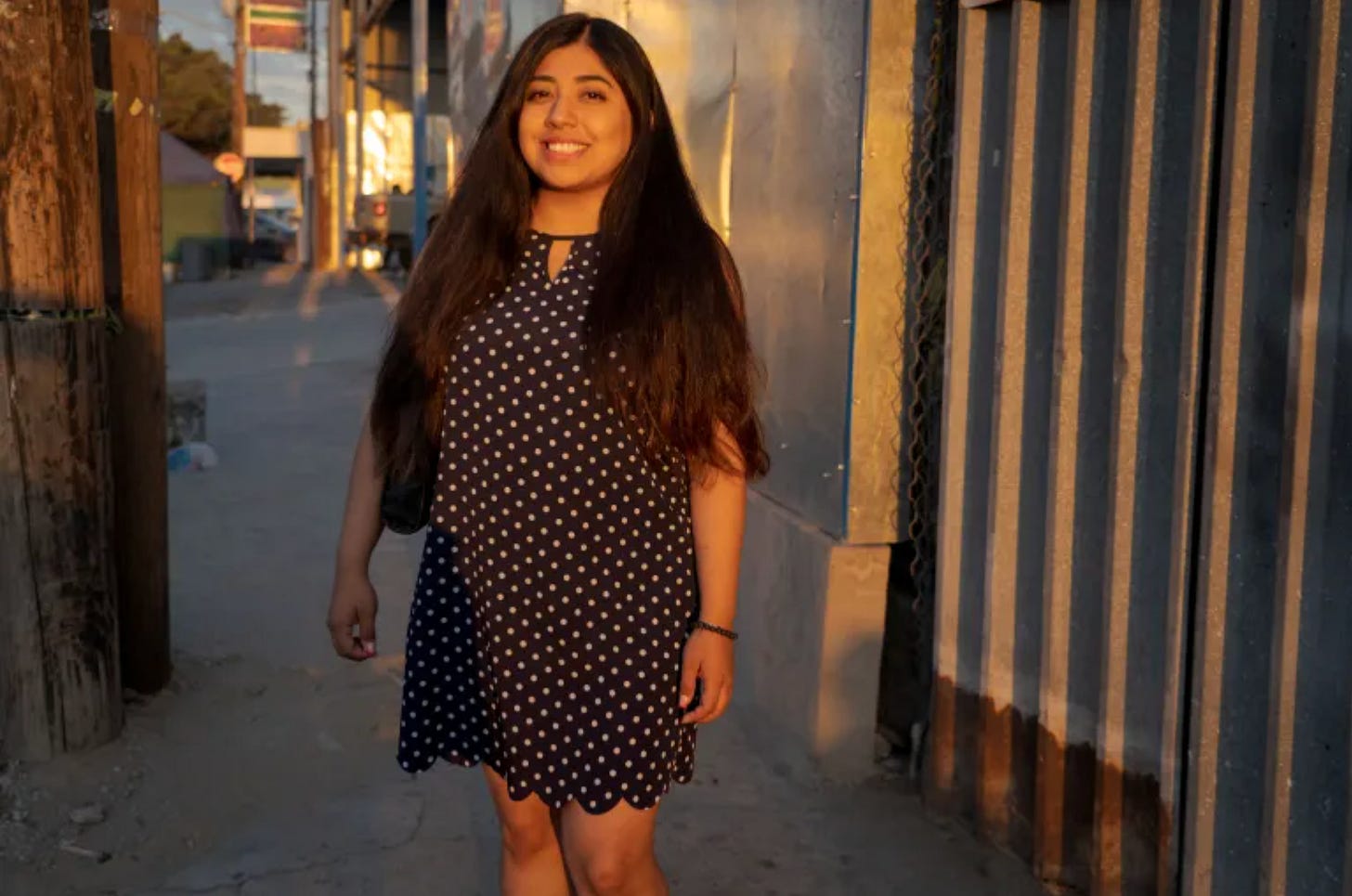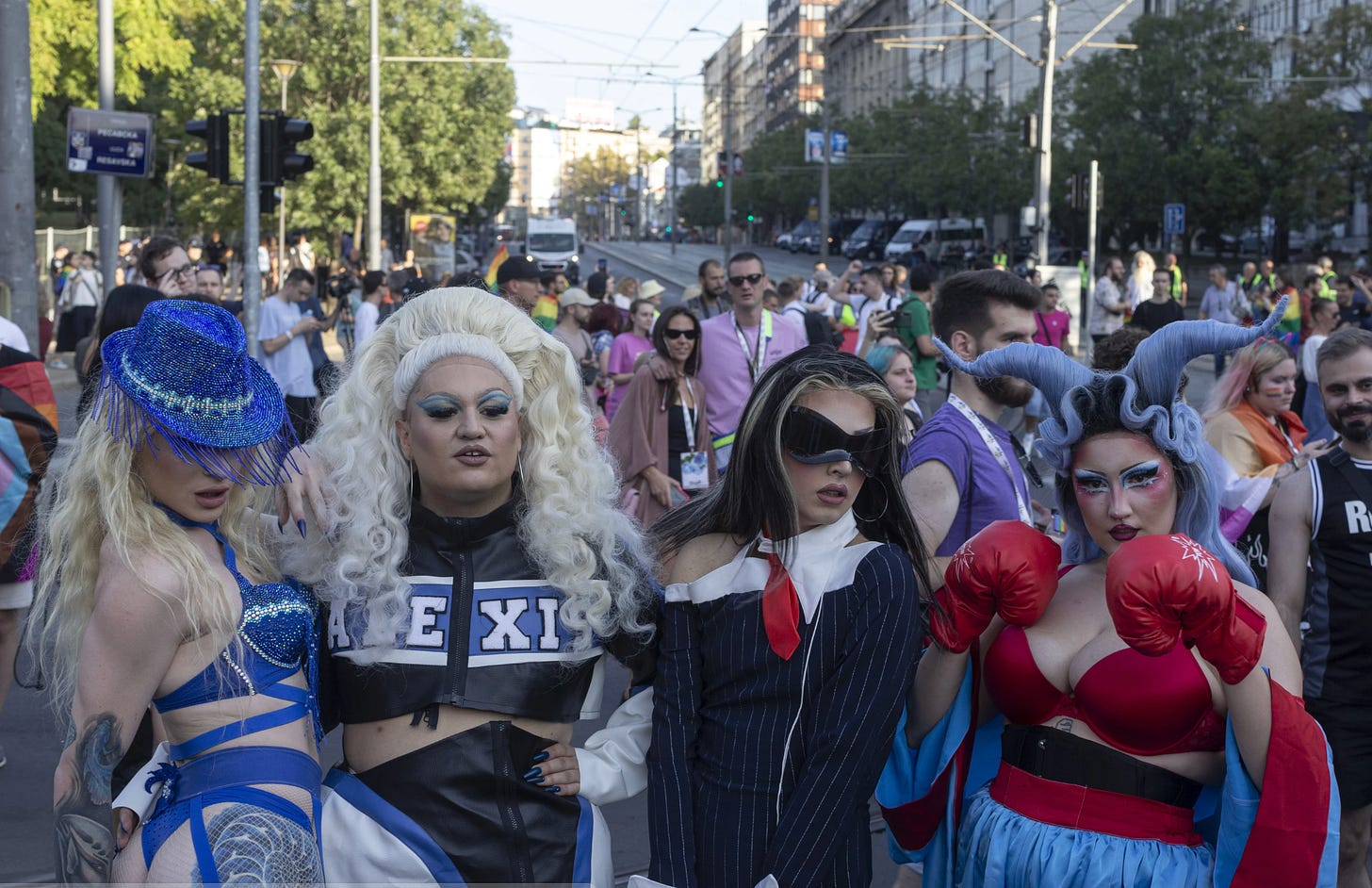Global Roundup: Mexico IPV & Self-Defence Case, Serbia Pride Event, France Sex Worker Rights, Iraq Girls’ Football Club, Canada LGBTQ Youth Advocates
Curated by FG Contributor Samiha Hossain
Alicia Fabregas/Al Jazeera
In 2019, Narciso shot her boyfriend Luis Rodrigo Juarez in self-defence after he had been intoxicated and awoke her with the barrel of a gun. Both Narciso and Juarez were police officers. Some of the officers who arrived at the scene were colleagues of Narciso but she says they viewed her as a suspect from the beginning. Narciso spent the next three years in pre-trial detention. When her case finally came before the court, she tried to explain her history of abuse. While Narciso had never filed a formal police report, she had told colleagues about Juarez’s violence and even enlisted a police unit once to protect her while she attempted to move out. But even then, she told the judge, Juarez had managed to get past the blockade and inside the house. The police, Juarez indicated, were on his side.
In October 2022, the judge rejected the allegation that Narciso’s life had been in danger. In his ruling, the judge found Narciso’s reaction to Juarez’s attack “excessive”. He said the evidence her lawyer presented was not enough “to cast doubt” on her guilt. He ultimately sentenced Narciso to 45 years in prison for aggravated homicide, a term much longer than some sentences in Baja California for femicide.
Researchers have found that powerful biases can shape the outcome of self-defence cases, particularly when women allege intimate partner violence. Many misconceptions revolve around the belief that women can simply leave the relationship to avoid violence. Narciso herself has had to address that belief.
You don’t realize that you are in a circle of violence. Your brain normalises the situation. -Alina Narciso
Narciso’s mother, Tehuaxtle, campaigned for her daughter’s release. Tehuaxtle talked to the media, women’s organisations, and human rights lawyers including Meritxell Calderon, who started to volunteer on the case. Calderon believes the judge’s actions speak to a larger lack of awareness among judges and prosecutors on women’s human rights issues. Ultimately, Narciso and her lawyer filed an appeal on October 25, 2022, on the basis that the court had not taken into account her history of abuse with Juarez.
The case gained widespread attention: the state governor of Baja California, Marina del Pilar, and congresswoman Michel Sanchez Allende both offered their support, and feminist groups helped raise awareness for Narciso’s appeal. Six months later, in May, the appeals court ruled in Narciso’s favour. It declared that she had indeed acted in self-defence, calling her actions “necessary” for her safety. In addition, the court sanctioned the judge who originally sentenced her to prison. He was ordered to take training courses in “gender perspective”.
On August 24, a law named in Narciso’s honour passed unanimously in the Baja California legislature, with 22 votes in favour and one abstention. Sponsored by congresswoman Sanchez, the Alina Law reforms the state’s penal code, requiring judges and prosecutors to take into account gender, abuse and intimate partner violence when weighing self-defence cases.
Drag performers are seen as they attend a Pride march in Belgrade, Servia, Saturday Sept. 9. Photo Marko Drobnjakoivic
Hundreds of Pride activists gathered in Belgrade, the capital of Serbia, on Saturday for the 11th consecutive Pride event in the country, amid a heavy police presence and anti-gay messages sent by the country’s conservative leadership and far-right groups. Participants held banners reading “We Are Not Even Close” as well as “Marriage” and “Queer Liberation not Rainbow Capitalism.”
Last year, the LGBTQ+ event was marred by skirmishes between the police and anti-Pride groups who believe the event goes against traditional Serbian Christian Orthodox values and should be banned. This year saw a heavy police presence of officers in riot gear blocking off central Belgrade. In a rally against the march, about 50 anti-gay protesters and Orthodox priests held religious icons in front of a downtown church as the Pride event participants passed by.
Before this year’s Pride event, Serbia’s populist president, Aleksandar Vucic, said that as long as he is in power, he wouldn’t approve a law allowing same-sex marriages or partnerships. He also said that he didn’t allow rainbow colored flags to be placed on flagpoles at his downtown office during the march. Prime Minister Ana Brnabic, a close Vucic ally, is the Balkan country’s first openly gay politician. She has, however, rarely spoken in favor of LGBTQ+ rights in Serbia.
Before the Pride event, the embassies and representative offices of 25 countries and the European Union delegation in Serbia issued a joint statement of support for the values of Pride and urging protection of the rights of LGBTQ+ persons.
A French sex worker demonstrates outside the National Assembly in Paris, Friday, Nov. 29, 2013. - Copyright Christophe Ena/AP
A total of 261 migrant, queer, and women sex workers tabled the case in 2019, which was approved by the court majority. The move came a day after a motion to criminalise the profession in all EU member states was filed for a vote in the bloc's parliament. The court ruled that the plaintiffs can be considered the victims of discrimination and violence, incited by a law introduced by the French government in 2016 against the "purchase of sex." Clients can be fined up to €1,500 if caught and are required to attend classes on the harms of prostitution.
Rejecting the French government's objection to admissibility, the court cited Article 34 of the European Convention on Human Rights to file the case. Article 34 of the ECHR facilitates "applications from any person, nongovernmental organisation or group of individuals" who claim victims of a violation by one of the "High Contracting Parties of the rights."
Sex workers have long said that criminalization makes their work more risky as they are forced to work in more dangerous and secluded areas. More than ten sex workers were reportedly murdered within a six-month period in France in 2019 following the crackdown, with several instances of police brutality allegedly targeted at them.
Credible research consistently shows that criminalisation increases physical attacks, sexual violence, and police abuse of people who sell sex. -Erin Kilbride, women’s rights and LGBT rights researcher at Human Rights Watch
The team celebrates Zubaida’s (centre) penalty kick that helped the Mosul Girls Football Club win the match. © IOM/Anjam Rasool
Girls in Iraq are defying gender norms and playing football with the Mosul Girls Football Club. Many girls on the team report initial hesitation from their families and relatives, followed by cautious approval. Today, a majority of the girls have their entire community’s unwavering support. The girls are local celebrities and an inspiration to their peers.
We are not boys. Generally, women and girls do not play sports in Mosul. It’s not common. My mother was afraid that I would fall and get hurt. But, eventually, she agreed. Now she is my biggest cheerleader. -Rama, 13
The football team started as a project implemented by the Sustainable Peace Foundation (SPF) of Mosul in 2021, led by Shahad Khaleel. Khaleel, 29, and her team worked with school teachers, community leaders, and parents to advocate for the participation of girls in their project, Sports for Peace. SPF is one of 22 grassroots organizations supported by the International Organization for Migration (IOM) in Iraq through the Wasl Civil Society Fund to design and implement community-level projects that address drivers of instability, displacement and violent extremism.
The most important lesson is teamwork. When we first started playing in teams, we weren’t sure how to work together and it created some tension. Football gave us the common ground to resolve some issues and helped us be stronger as a team. Now we dominate the field. -Zubaida, 14
Over 60 per cent of Iraq’s population of 43.5 million are under the age of 25. Many have seen their country go through cycles of extreme violence, conflict, and instability, and yet play a limited role in the national peace and reconciliation efforts. Through team building and idea exchange, Sports for Peace aims to provide a common platform for the next generation of girls in Mosul to challenge norms, defy societal expectations and advocate for peaceful coexistence. The project has been extended for another six months and will continue working with over 150 girls in 10 teams across Mosul.
Tor La (left) is a youth leader with OK2BME and Grade 10 student in the region. Kaden Pitcher is in Grade 12 and student leader with their local Gender and Sexuality Alliance. (Carmen Groleau/CBC)
LGBTQ youth weigh in on coming out in high school amid comments by the education minister in the Canadian province of Ontario that school boards should disclose the identities of trans students to parents. Ontario Education Minister Stephen Lecce cites “health implications” and “respecting the rights of parents” for his stance. He didn't give any indication that there was legislation to follow when pressed by journalists about it, and left it up to the school board policies.
When it comes to coming out in high school, Tor La, a youth activist and Grade 10 student in Waterloo region, and Grade 12 student Kaden Pitcher, believe that young people should be selective about who they tell in order to stay safe.
If you don't feel safe enough, you shouldn't force yourself to say your name and pronouns. -Tor La
In an open letter to Lecce by Pflag Canada York Region — an LGBTQ organization — pushed back against the stance that it is the "parent's right to know" the gender identity of gender non-conforming or transgender students.
We wish to make our position clear, any attempt to infringe upon the rights to self-determination and disclosure of LGBTQ2IA+ kids and their identities will be met with fierce opposition by our community and allies. It is a mistake to favour a parent's right to know over a queer kid's right to disclose. Few things are more painful for a queer person than the feeling of being forced to come out. -Open letter
Samiha Hossain (she/her) is an aspiring urban planner studying at Toronto Metropolitan University. Throughout the years, she has worked in nonprofits with survivors of sexual violence and youth. Samiha firmly believes in the power of connecting with people and listening to their stories to create solidarity and heal as a community. She loves learning about the diverse forms of feminist resistance around the world.








